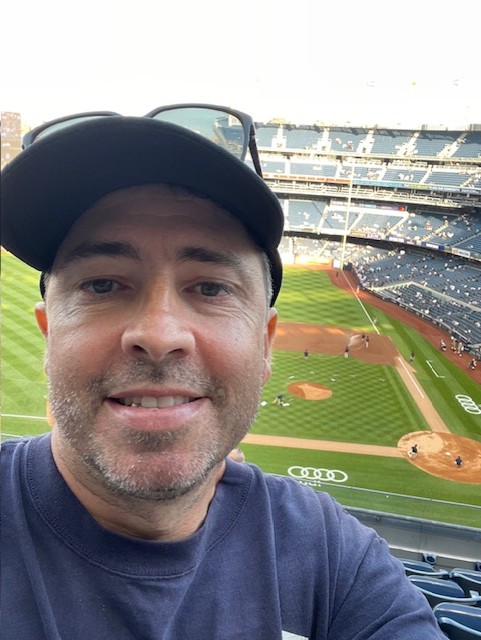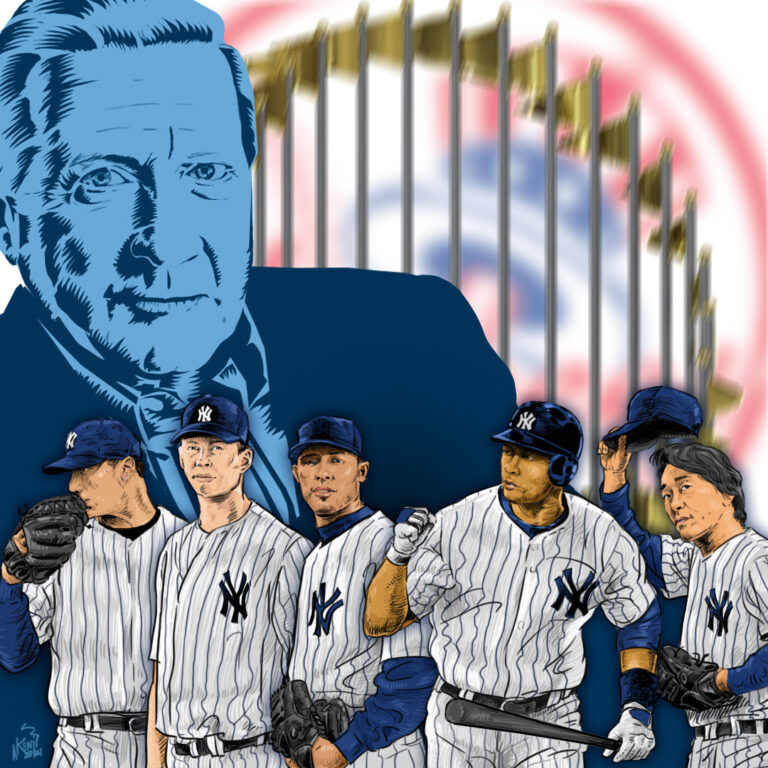By the simple laws of math, a postseason baseball game matters more than one from the regular season. After all, we’re talking 162 games for a team spread over half a year versus maybe 20 games across a single month.
But it isn’t the math that gets our senses tingling in anticipation at this time of year. The weather is cooler (at least in the Northeast) and the nights arrive a little sooner, a reminder that the season’s final chapter is upon us. And every home run, rally-snuffing strikeout or error that normally would be regurgitated in the highlights before getting forgotten in the shuffle instead becomes a momentum-changer with the potential to seriously impact a team’s fortunes.
Simply put, the postseason is where many of our most vivid baseball memories are formed.
My first baseball memory is from the postseason. I remember staring at a fuzzy TV screen, possibly at a friend’s home, that showed the final score of Yankees 13, A’s 3 – a victory that gave New York a 2-0 series lead in the 1981 ALCS.
Ultimately, the Yanks would go on to lose to the Dodgers in the World Series that year. I didn’t know that this was an anomaly in the long, colorful rivalry between the two teams. I also didn’t know that the Yanks were about to experience another anomaly with an extended playoff drought across the majority of my formative years as a fan.
So you’d think my favorite postseason memory would be when Charlie Hayes drifted behind third base to snare the final out of the 1996 World Series. That was undeniably enjoyable, but I was in college at the time, and may have been a little distracted by other activities.
The start-to-finish dominance of 1998 was amazing and ’99 was certainly gratifying as well, but I think some Yankees fans would admit to getting a little spoiled by that point. This sentiment was driven home in 2000, when the Yanks won all of 87 regular season games before making it look as simple as flipping the switch to “playoff mode.”
What followed was the stunning loss in 2001, and then a string of disappointing finishes in which it became obvious that the magic of previous Octobers wouldn’t be so easily rediscovered. Josh Beckett was too much in 2003. The Red Sox delivered the finishing blow in 2004, one year after enduring their own gut punch for the ages. The Bombers didn’t even make it past September in ’08, instead offering the consolation prize of a thank you speech from Derek Jeter after the final game at old Yankee Stadium.
Which brings us to ’09. With George Steinbrenner still running the show (but very near the end), the Yanks had engineered one of their “let’s throw caution to the wind” reloads. In came an ace (CC Sabathia), a No. 2 (A.J. Burnett), an MVP-caliber first baseman (Mark Teixeira) and a solid veteran outfielder (Nick Swisher). All four largely lived up to expectations, which, when combined with the output of holdovers Alex Rodriguez, Derek Jeter, Robinson Cano and the rest, turned them into a 103-win juggernaut.
I was fortunate to wind up with a ticket for Game 1 of the ALDS, and watched from the left field stands as (gasp!) the Twins took an early lead off our ace. Jeter then tied it up with a two-run homer in the third, before A-Rod struck out to end the inning and ignite an angry buzz from the packed house.
You may recall that A-Rod’s postseason batting line since 2005 was horrendous, and Yankees fans weren’t about to tolerate another flameout. So when he came up again in the fifth with two out, Jeter on third and the Yanks clinging to a one-run lead, you could feel the boo birds getting ready to unleash.
Except A-Rod managed to deliver a single into left to cut through the tension and extend the inning, a result that loomed even larger when Hideki Matsui followed with a two-run blast. Off the schneid, A-Rod followed with a rocket off the right field fence in the seventh to pad the lead and help CC cruise to an easy win.
Back in the stands for Game 2, I watched as A-Rod continued exorcising the demons with a game-tying single in the sixth. By the time he came up with the Yanks down two in the ninth and Joe Nathan on the mound, he had earned enough leeway to escape the wrath of the faithful if a strikeout ensued. Instead, this version of A-Rod got all of a 3-1 fastball; it wasn’t among the farthest of his career, but that ball just kept going. Two innings later, Teixeira yanked one from the right side that barely cleared the left field wall for the win.
Fast forward to the ALCS and a score to be settled with the Angels, who had bounced the Yankees from the playoffs in 2002 and 2005. It was unusually cold at the beginning of the series – I think there were flurries at one point – which may have led to the Angels kicking the ball around for five errors across Games 1 and 2.
That was a bad way to try and get past a full-steam CC in the opener, but the visitors had a chance to tie the series in Game 2, until you-know-who came up in the 11th. It was clear by this point that the hex behind A-Rod’s recent playoff miseries had been reversed, so I don’t think anyone was surprised when he hammered an 0-2 fastball into the right field stands to tie things up, paving the way for a 13-inning walk-off.
Fast forward to Game 6, when Mr. Reliable – Andy Pettitte – did what he always did at this stage of his career, which was nibble and weave his way through 6.1 innings for another playoff win. When Mariano came in for the six-out save, the Yankees up by two, I was overcome by a surge of elation: We are going to win – he is not blowing this save! Even when Vlad Guerrero hit a grounder that bounced 40 times before escaping through the middle to score a run, my confidence was impenetrable. HE IS NOT BLOWING THIS SAVE!
Mo got out of the inning, and when the Yankees tacked on two more runs, courtesy of two errors, the Angels were finished.
I was a little nervous about the Phillies. They sported much of the same core that had won the World Series the year before, and had taken two of a three-game set in the Bronx earlier in the season.
The bad guys landed the first blow thanks to two Chase Utley home runs off CC, the first time a lefty batter had gone deep twice off a lefty pitcher in a Fall Classic contest since Babe Ruth in 1928. Yowsers. And Cliff Lee, a thorn in the Yankees’ side in recent years, was thornier than ever in a complete-game win.
Game 2 was billed as Pedro Martinez’s grand return to New York. It had been a long time since Pedro was in the best-of-all-time conversation, but I got caught up in the hype surrounding this emblem of the Yankees-Red Sox wars, and to his credit, Pedro largely kept the Bombers off-balance over six innings. But Teixeira and Matsui touched him for home runs, and the Jekyll-and-Hyde-like Burnett turned in one of his stronger outings to pass the baton to Mo for another six-out save.
Game 3 took place on Halloween, and I caught snippets of the contest through my Bernie Madoff mask at a party (I won best costume!). Pettitte was off in the early going, but it was a case of bending and not quite breaking. When I glanced up again in the fourth, the umps were reviewing an A-Rod fly that had struck a camera atop the right field wall. The good-luck spell still working, it was ruled a home run, and the Yanks pulled ahead for good the following inning thanks in part to Pettitte’s RBI flare to center.
Up for more heavy lifting on short rest, CC kept the Phils in check for much of Game 4 until he was dinged by Babe Utley again in the seventh. But the key play of the night came on the basepaths; after winning a nine-pitch battle with Brad Lidge with two out in the ninth, Johnny Damon stole second, and immediately took off for an unguarded third base with the defensive shift on for Teixeira. A-Rod stroked the go-ahead double, Jorge Posada tacked on two more with a single, and it was on to Mo to finish the job.
Following an encore of the Utley and Lee show in Game 5, the Yanks had another chance to put the series away against Pedro in Game 6. The media was still trying to push the “He’s out for revenge!” angle, but I had a feeling we’d already seen his best for the series. Besides, we had Godzilla.
A steady contributor if not quite a superstar over seven seasons, Matsui was clearly saving his best for what turned out to be one final night in the Bronx. He blasted a towering two-run homer off Pedro in the second, and then laced a two-run single in the fourth that quickened the end of the future Hall of Famer’s outing. Two innings later, Matsui launched another drive off the right-center field wall for a two-run double, giving him an incredible six RBI for the game.
The Phils made Pettitte work over his 5.2 innings, but there was no catching the Yankees on this night, and the season ended in fitting fashion with Mo getting Shane Victorino to roll over a cutter for the final out.
Matsui was a deserving series MVP, but there could have been postseason honors handed out all around: A-Rod was a force of nature, turning in a .365/.500/.808 line with six homers and 18 RBI in 15 games.. CC looked every bit the horse with a 1.98 ERA over five starts. Pettitte won four games. Jeter, who I’ve barely mentioned, was in the middle of everything as usual, contributing a .344 average with three dingers and 14 runs scored.
Strangely, although this was the last time the Yankees won the World Series, I feel this postseason has been overlooked in team history. Maybe it was overshadowed by the teams that won three straight and four of five titles a decade earlier. Maybe we’re not far enough removed for the full nostalgic treatment.
But this run had everything. Hated rivals vanquished. Formidable foes overcome. Heroes stepping up big time. A clear and decisive triumph.
Buster Olney wrote a book called The Last Night of the Yankee Dynasty, but its publication in 2004 was a few years too early for the title to really ring true. 2009 truly was the last night of the Yankee dynasty, the last hurrah of the era of Jeter, Pettitte, Posada and Mo, and for that, I will always count that autumn among my favorites as a fan.
Thanks to Baseball Reference and its extraordinary research database, Stathead, for help in assembling this piece.

Tim Ott
Tim's early yearnings for baseball immortality began on the dirt and grass of the P.S. 81 ballfield in the Bronx. Although a Hall of Fame career was not in the cards, his penchant for reading the MLB record book and volumes of history tomes led to an internship with MLB.com in 2002. Tim fulfilled an array of roles over the next nine years at the company, from editorial game producer to fantasy writer and editor and reporter for MLB-related promotions. While a busy freelance writing career has since taken him in other directions, Tim has always kept baseball in his heart, and is happy to be back to observing and reflecting on our great pastime.


